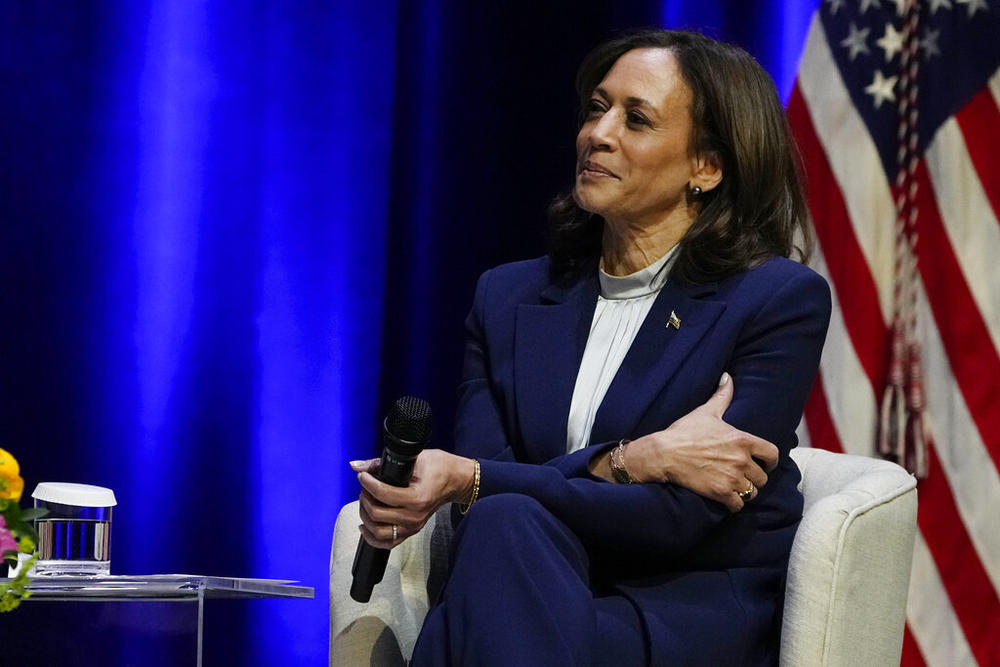
Caption
Vice President Kamala Harris talks about climate change at Georgia Tech on Wednesday, Feb. 8, 2023, in Atlanta.
Credit: AP Photo/John Bazemore
Now that President Biden has dropped out of the race for president, Democrats are looking for the least disruptive, most unifying path forward. Distinguished Professor of history at American University Allan Lichtman spoke with GPB’s Peter Biello about what comes next.

Vice President Kamala Harris talks about climate change at Georgia Tech on Wednesday, Feb. 8, 2023, in Atlanta.
Now that President Biden has dropped out of the race for president, Democrats are looking for the least disruptive, most unifying path forward. With less than a month until the Democratic National Convention in Chicago, important decisions need to be made. For some insight into what comes next, we turn to Distinguished Professor of history at American University, Allan Lichtman. He spoke with GPB’s Peter Biello.
Peter Biello: So, in your view, are the Democrats smart to unify immediately around a candidate now, or does it make sense for them to debate different candidates at the convention?
Allan Lichtman: The verdict of history is crystal clear: It would be an enormous mistake for Democrats to have a big party brawl and try to select a candidate in a contested nomination battle. They already have created an open seat by pushing Biden out of the race. A big party battle would add a contested nomination. Since 1900, the party holding the White House has never, I repeat, never won when it's an open seat election with no incumbent running and a major contest for the party nomination. On the other hand, if you simply have an open seat but a consensus nominee, then the White House party does have a decent chance of winning.
Peter Biello: Is this change in the Democratic Party right now an opening for a third-party candidate, a chance to pick up some votes that otherwise not — may not have gone their way?
Allan Lichtman: Those who think they know instantly what the effect on a third-party candidate is going to be — I have a big bridge in my hometown of Brooklyn that I'll sell to you. There is no way of knowing immediately what the effect is going to be.
Peter Biello: If Harris is the nominee, how important is her vice-presidential pick?
Allan Lichtman: Not important at all, according to "The Keys to the White House" and history.
Peter Biello: And "The Keys to the White House" that you're referring to are several factors that you've developed that you think are crucial for winning the presidency. Among them: incumbency, being charismatic, major foreign or military success, absence of a scandal.
Allan Lichtman: There is no key for the vice presidency. A lot of people think there might be. For example, when George H.W. Bush selected the lightly regarded Dan Quayle. Again, a lot of the conventional pundits with no scientific basis, "Oh my God, this is going to sink his campaign." And Quayle experienced the worst moment in the history of vice presidential debates, or maybe any debate, when he compared himself as a young guy to John F. Kennedy and the Democratic nominee, Lloyd Bentsen, said, "Sir, I knew John F. Kennedy. He was a friend of mine. And you, sir, are no John Kennedy." And, of course, not only did Bush win, but he won quite handily by 7 to 8 points in the popular vote and an overwhelming majority in the Electoral College.
Peter Biello: Based on your key system, when do you think you'll have a prediction on how this election will go?
Allan Lichtman: I've made it very clear I haven't made a final prediction, although I can tell you where the keys stand now and what to look for. But I will make a final prediction, I expect, after the Democratic convention next month, so it's not that far off.
Peter Biello: What should we be looking for?
Allan Lichtman: Let's presume Harris becomes the consensus nominee. That would put the Democrats down three keys: the mandate key because they lost U.S. House seats in 2022, and the incumbent charisma key, because Harris is not an FDR. And of course, the incumbency key. So what are the keys to look for that could turn this election? There are four shaky keys: third party — will RFK Jr. stabilize at least at 10% in the polls? — social unrest, and foreign/military success and failure. Presuming Harris is the consensus nominee, three of those four keys would have to fall to predict the Democrats' defeat. I have often been asked: What does Joe Biden (when he was still the candidate) have to do to win this election? My answer is, “Govern well.” And a critical thing that could really secure at least one key, the foreign policy success key, would be if Biden succeeded in brokering a cease fire and hostage release in the Middle East.